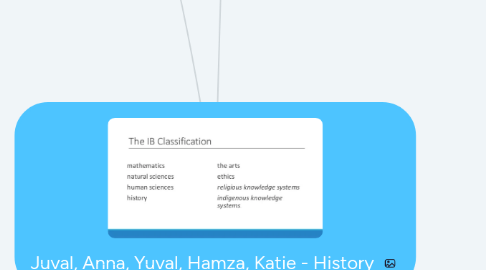
1. Methodology (Yuval)
1.1. Historians
1.1.1. What do Historians do?
1.1.1.1. Historians are employed by someone-government, or a private company
1.1.1.1.1. Their job is to learn about historical events in depth
1.1.2. Chronicler
1.1.2.1. Historians can predict an evolving event and decide to examine it for a long time
1.1.3. Researcher
1.1.3.1. Long research time
1.1.3.2. Use of evidence
1.1.3.2.1. Proof must be given to every fact
1.1.4. Interpreter
1.1.4.1. Various developments
1.1.4.1.1. In some cases, part of a historian's work is to examine different developments that could have occurred, considering the facts
1.1.5. Narrator
1.1.5.1. Transfer of information
1.1.5.1.1. An important role of the historian is to ensure that the information is transmitted, recorded and preserved
1.2. the importance of objectivity in historical research
1.2.1. Analysis and interpretation
1.2.1.1. The ability to distinguish between parts of writing that are well established and logical
1.3. use of different sources
1.3.1. Primary sources constitute the basic "raw material" of history; They are sources that were discovered during the time period.
1.3.1.1. secondary sources are studies and articles written on the basis of the primary source
1.4. evidence
1.4.1. Without evidence, the claim will not count as right
2. Scope & Application (Juval)
2.1. History ≠ Past
2.1.1. Knowledge produced by individual historians is combined to create a shared understanding of history.
2.1.1.1. Our version of history might not be the same as what happened in the past
2.1.1.2. "The bodies of knowledge about the past produced by historians, together with everything that is involved in the production, communication of, and teaching about that knowledge." - History.ac.uk
2.1.2. The past is what has happened, whether we know about it or not
2.1.3. History is our best collective understanding of the past
2.2. History must be as accurate as possible because
2.2.1. It provides a society with identity
2.2.1.1. People learn about their country's independence
2.2.1.2. Provides a community with stories about their landmarks
2.2.1.3. Gives context for art and literature
2.2.2. It is used to solve world problems
2.2.2.1. Helps a third party understand conflicting sides' perspectives
2.2.2.2. Allows leaders to consult previous solutions to a similar problem
2.2.2.2.1. (Semi-relevant example: the ancient Romans were successful at military confrontations because they documented and studied past battles to see how they could improve.)
2.2.3. It is used to predict the future
2.2.3.1. Availability of supplies/populations
2.2.3.2. Political moves
2.2.3.3. Is often inaccurate, as unpredictable things happen
2.2.3.3.1. Drop in fertility in 1970s
2.2.3.3.2. Available resources after natural disasters
2.3. History is not always accurate
2.3.1. Different memories and perspectives from witnesses
2.3.1.1. 9/11 witnesses' stories changed with time
2.3.2. Stories changed to fit agendas
2.3.2.1. People edited out of photos with Stalin
3. Historical Development (Anna)
3.1. Human activities are culturally + socially influenced
3.1.1. Some statements have been made-"each age rewrites history"
3.1.1.1. the scope and the writing of history has extended
3.1.1.1.1. no one type of history is better then the other
3.1.1.1.2. Recent study: Comparative study of history + cultural history
3.1.1.2. History is not something that starts in one place or direction, and then shifts
3.1.2. history is NOT culturally 'constructed'
3.2. Must be disciplined which is based off analayisis of evidence + the use of the language used to write it up
3.2.1. there must be are awareness of the methods + principles of the disciplines and how it is represented to the wider audience
4. Language & Concepts (Katie)
4.1. Writing History
4.1.1. Provides training in writing up the results of research in the form of:
4.1.1.1. Essays
4.1.1.2. Reports
4.1.1.3. Dissertations
4.1.2. Essentials to writing
4.1.2.1. Clear and effective communication
4.1.2.2. Well Structured
4.1.2.2.1. Why must they follow this?
4.1.2.3. Written in precise and explicit language
4.1.3. Essential Injections
4.1.3.1. Revise
4.1.3.2. Reflect
4.1.3.2.1. Not to achieve elaborate literary effect, but to convey precisely what you mean to the reader
4.1.4. Exact Uncluttered Style
4.1.4.1. Another essential to communication
4.1.4.2. Not an extra but a necessity to the structure
4.1.4.3. IF style can be elegant, this is better as if it more effective to convey the right meaning
4.2. Core of History
4.2.1. Sentiment is not enough
4.2.1.1. THOUGHT is what is needed
4.2.2. Must be a Scholarly Discipline
4.2.2.1. Based on thourough analysis of evidence
4.2.2.2. Writing up of which language is deployed must have upmost precision
4.2.3. Familiarity of writing problems are encountered highly
4.2.3.1. In the primary sources
4.2.3.1.1. Obscure technical terms
4.2.3.1.2. Reading through an edited selection of excerpts from primary sources will have the salutary effect of bringing one in contact with the thinking and language of past generations, but it will not amount to research
4.2.3.2. In the secondary sources
4.3. Those who are ignorant of history see:
4.3.1. Primary Research as "More Truthful"
4.3.2. Secondary Research "Less Truthful"
5. Personal Knowledge (Anna)
5.1. when information is passed through multiple people over time - information might get changed
5.1.1. The Japanese school are concerned of the content of the information in the schools history books
5.1.1.1. Japanese minister of education meet with Korea and China to see the different perspective of the different aspects of the history
5.1.1.1.1. China believed that the Japanese history book worded the history of Japan with "innocuous" titles
5.1.1.2. every 4 years the books are assessed
6. Methodology 2 (Hamza)
6.1. OPVL
6.1.1. Technique for analysing historical knowledge
6.1.1.1. Origins
6.1.1.1.1. Primary Sources
6.1.1.1.2. Secondary Sources
6.1.1.2. Purpose
6.1.1.2.1. Initialisation of evaluation
6.1.1.3. Value
6.1.1.3.1. Evaluation of Text as Evidence
6.1.1.4. Limitations
6.1.1.4.1. Ending of Evaluation
